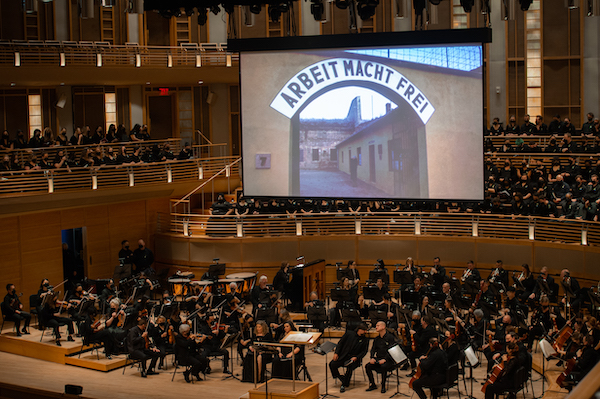At 20th anniversary, “Defiant Requiem” still makes a powerful statement

The “Defiant Requiem” was performed on its 20th anniversary Wednesday at The Music Center at Strathmore. Photo: Randy Sager
A conductor named Rafael Schächter, condemned to the Nazis’ Terezín (Theresienstadt) concentration camp, managed to smuggle in a piano score of Giuseppe Verdi’s Requiem. He used that score and sheer force of will to help some of his fellow prisoners learn this lengthy, operatic, thoroughly Catholic work, and together they performed it 16 times between 1943 and 1944 while suffering all the privations that the Nazis could inflict upon them.
When conductor Murry Sidlin discovered this story two decades ago, he wanted to shine a light upon it for the rest of the world. To do that, Sidlin, a familiar face to local audiences (former resident conductor of the National Symphony, currently on the Catholic University of America music faculty), conceived “Defiant Requiem: Verdi at Terezín.” The event presents a performance of the Requiem augmented with Sidlin’s narration, actors portraying Schächter, and videos of surviving participants discussing the experience of performing in the camp.
Wednesday night was the 20th anniversary of the first performance of “Defiant Requiem,” and Sidlin marked the occasion by presenting it at the Music Center at Strathmore.
Sidlin faced an obvious challenge in conceiving his presentation: How could he weave in the documentary materials about the Terezín performances without disrupting the power of Verdi’s Requiem itself?
Instead of having the orchestra perform throughout, at times Rita Sloan played a slightly out-of-tune upright piano, to evoke the sound of Schächter’s performances.
Sidlin also selected recollections and performed texts to drive the performance, particularly when he had Sue Struve, as The Lecturer, and Dan Manning, as Schächter, engage in a discussion about whether it was wise to perform the Verdi in the camp. This concluded with Schächter’s vow to perform the Dies Irae and “sing to the Nazis what we cannot say to them” about how “nothing shall remain unavenged,” a stirring lead-in to the apocalyptic force of this most famous part of Verdi’s Requiem.
Indeed, Sidlin and his forces delivered a rousing performance on Wednesday. Assembled for the occasion were a large freelance orchestra and an even larger chorus, the latter of which included chorus members from seven area universities. The variegated voices blended and projected well, with the text remaining clear, although the screen on which the survivors’ reminiscences were projected had the unfortunate effect of blocking some of the choral sound.
The soloists – soprano Jennifer Check, mezzo Ann McMahon Quintero, tenor Copper Nolan, and bass Nathan Stark – made a fine quartet. Nolan and Stark contrasted well when the tenor’s soulful, round tone in the Ingemisco’s plea for mercy was followed by the bass’s rock-solid condemnation in the Confutatis. Check’s florid soprano had no trouble soaring above the massed chorus and orchestra, while still sounding intimate and affecting, as in the closing prayer for deliverance, Libera Me.
Sidlin conducts all performances of Defiant Requiem, and 20 years has given him a sure hand at it. Not only does he know how to weigh the big climaxes against more intimate moments, he knows how to time the transitions between narration and performance to make it as seamless as possible.
As the performance drew to a close, Defiant Requiem began to present more of the suffering at Terezín, and Sidlin’s own narration focused more on the rebellion inherent in Schächter’s unlikely match of circumstance and music. Footage from a staged Nazi propaganda film played during the Agnus Dei, curdling the relative calm of the score.
Sidlin made clear before the performance of the closing Libera Me that liberation came too late for Schächter, who died a month before the Allies took Terezín. The ensuing performance, with particularly affecting singing from Check, felt all the more wrenching in its plea, and the reprise of the main Dies Irae theme all the more scathing.
